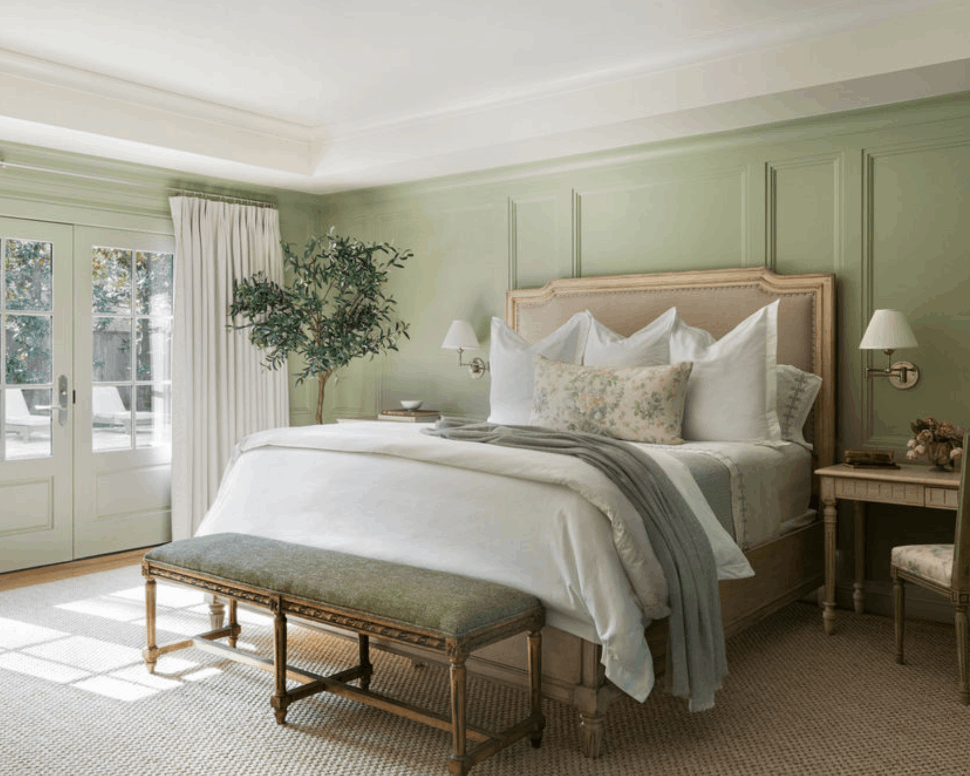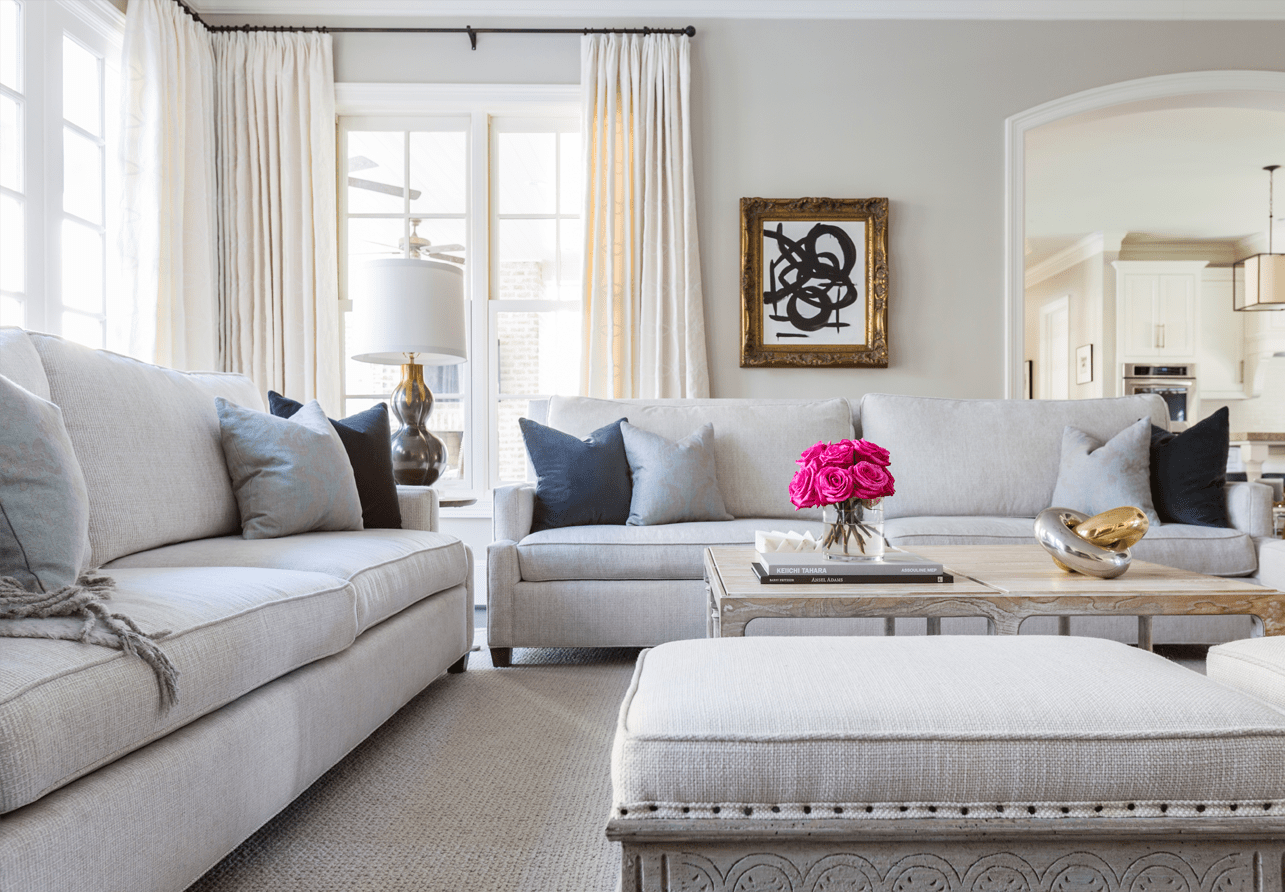Elegant and organic, the French Modern interior design style is a genre of juxtapositions. It pairs gilded accents with natural elements and contemporary art with antique furniture. The French Country interior design style is a bit more rustic, embracing the imperfections that come with age. Both are easy yet elevated, making French Country and French Modern the epitome of livable luxury. Curious about these timeless design styles? Follow below for eight ways to bring the French Country and French Modern styles into your home this Fall.

What are French Country and French Modern Interior Design Styles?

As mentioned in the introduction to this post, there are a few subtle differences between French Country and French Modern. With similar color palettes, glamorous accents and organic materials, the rustic nature of French Country is what truly sets it apart from French Modern. In a recent article for Better Homes & Gardens, Jessica Bennett writes that “French-country style combines European elegance with rustic comforts.”
French Country interiors are typically filled with “antique furnishings, weathered finishes, natural materials and warm neutrals.” While French Country interiors are “welcoming and casual,” French Modern interiors are more intentional and sophisticated. French Modern strikes a stunning — and somewhat surprising — balance between the ornate opulence of antique French interiors and the sharpness of contemporary design.
Our Hedwig Village project meshes French Country with French Modern in a remodeled 1920s Houston home. From custom millwork and arched windows to antique lighting and a serene color scheme, we draw inspiration from Hedwig Village throughout this post.
8 Ways to Bring French Modern Into Your Home
#1 Focus on Architectural Details

First on our list of ways to bring French Modern into your home is to take inspiration from its architecture. Though we replaced the roof, added dormers and updated the interior at the Hedwig Village home pictured above, we also retained many original elements. To honor its history — which dates to the 1920s — we installed vintage doors in the kitchen and designed period-appropriate molding in the primary suite.
When infusing your own home with French Modern interior design style, try to preserve existing architectural elements. Focus on antique windows, tray ceilings, medallions, niches, molding, tresses and wooden beams. Tread carefully as you renovate any spaces with historic significance. Instead of ridding your home of the old, honor its idiosyncrasies with appropriate lighting, a great color scheme and due respect.
As Kristin Hohenadel writes in an article for The Spruce, “a room’s shape, character and history is the starting point of any good design.” In France, many homes “have quirky layouts and charming architectural details.” According to Hohenadel, “the French are careful not to gut renovate all the character and history out of a space.” As you decorate your own space, lean into hand-crafted details that make your home special.

As you design your home’s French Modern interior, try not to forget about its exterior. In our Hedwig Village remodel, we adapted motifs and other elements like archways, vaulted ceilings and exposed wooden beams from within the home.
To make the outdoor loggia feel more like a continuation of the indoor living space, we added a formal fireplace. We also carried the limestone-washed brick from the kitchen into the backyard. This continuity between exterior and interior is vital for a home inspired by French design.
#2 Mix Antique, Modern and Contemporary Pieces

Next on our list of ways to capture French Modern style is to mix antique and vintage with contemporary and modern pieces. French interiors are eclectic yet elevated. To achieve this layered look, one must pair contemporary artwork with delicate pieces from the past. Mixing modern and antique pieces creates a collected rather than curated feel, making it appear more organic and less staged.

Quoting French design expert Constance Gennari in an article for MyDomaine last Fall, Gabrielle Savoie explains. According to Gennari, the eclecticism of French interior design is what sets it apart from American interior design. Savoie writes that “French designers have no qualms about placing a modern chair beside an 18th-century dresser.” They do not think twice about “styling ultra-contemporary lighting against an ornate background.” These juxtapositions add character and dimension to a space that might have fallen flat without.
Design Tip
If you prefer to hang onto your home’s existing furniture, consider swapping bland hardware for more opulent versions. The armoire in your bedroom or china cabinet in your dining room might enjoy a little update. When choosing older furniture or accents for a French Modern interior, think about the motifs, palettes and line-work of antique and vintage objects. Art Nouveau, Art Deco and Arts & Crafts pieces are easy to blend with both contemporary and antique pieces. This is because pieces from these periods are a bit stylized but also very organic and versatile.
#3 Make Romantic Millwork a Priority

The French know their millwork. Whether hand-hewn or carefully molded, created in the country or cast in the city, French millwork is some of the world’s most sophisticated. As we all know, architectural decoration — particularly in the form of sculpted clay, carved stone and etched wood — has been around since Ancient times. The French, however, have ushered the ancient practice into our modern age.
Writing for The Wall Street Journal, Steve Garbarino notes that the French “elevated the light-and-shadow effects of moldings to new and singular heights.” After all, it was the French who coined trompe l’oeil — a term typically applied to paintings that “trick the eye” with unnerving optical illusions.
Prior to the fourteenth century, Garbarino writes that no country achieved the “subtleties and nuances” found in French moldings. Once enjoyed only by royalty and the very rich, French molding is now available to many who admire it.

In our recent Hedwig Village project, the LUDC team designed brand-new paneling and molding for the primary suite and several other spaces. As we note in the project reveal, we based all millwork paneling on furniture selected by Molly Solich Design. We also tied the millwork to existing windows and doors to ensure the space would feel very cohesive.
As you can see from the photo above, the paneling aligns perfectly with the bed frame. Even the wall sconces were considered when designing the millwork for this primary bedroom. In the primary bath and connecting vestibule, we designed romantic millwork with cove edging and a special French curve detail. These delicate details might be subtle, but they make a huge impact on the final design.
#4 Choose a Classic Color Palette

Fourth on our list of ways to embrace French Country interior design is to adopt a classic color palette. In our Hedwig Village project, we opted for an earthy yet elegant palette with contemporary pastels. French Modern and French Country interiors typically adapt a traditional color palette for contemporary tastes. We chose to draw inspiration from nature — opting for sage green, warm beige, dove gray and pale blue. Other colors to consider include blush, coffee, mauve and gold.
#5 Make It Timeless — Not Trendy

French Modern and French Country interior design is beloved for its easy elegance and timeless sophistication. This is due in large part to the use of natural materials, classic colors and simple shapes. It is also due to a certain level of restraint when decorating. When creating your French Modern interior, avoid following too many trends.
Your home’s interior should not be easily pinned as replicating a design style. It should look and feel like a home that has evolved over time. Stick to clean lines, heritage prints and natural materials to keep your interior timeless. Also make sure that your home meets the needs of its occupants. This was a primary goal of our Hedwig Village remodel, the main home of which was far too small and cramped for its family.
Try to root your home in the surrounding environment by choosing materials that reflect local resources and filtering natural light throughout the home. Avoid matchy-matchy furniture that feels like it came from a big-box store. Remember, a mixture of elements that are alike and different, new and old makes a home feel lived-in. It provides texture, balance and dynamism. For more tips, head over to our post “How to Create Timeless Interiors in 17 Steps.”
#6 Opt for Organic Materials and Fresh Flowers That Connect Your Home to the Landscape

As noted above, mixing modern and contemporary pieces with antique and vintage objects makes a space richer and more layered. Adding florals and houseplants to your home achieves a similar effect. These vibrant blooms create a stunning contrast between the ephemeral and the eternal. Plus, they help your home’s interior change with the seasons. To connect your home to the surrounding landscape, either cut flowers and foliage from your own garden or shop at local farmers’ markets. Learn to arrange shelves like a designer here.
Choose full, low-profile arrangements for kitchen islands and dining tables. Opt for taller vases in entryways and bud vases on shelves. As you plan out your flower arrangements, carefully consider the type of vessel in which each will live. Follow advice from Jennifer Tzeses in her article “How to Decorate a Home with Fresh Flowers” for Mansion Global. Jennifer Tzeses writes that “‘the vessel is part of your bouquet…[so] don’t limit yourself.”

When creating a traditional arrangement, opt for an unexpected vessel like those pictured above. For contemporary arrangements with a more sculptural feel, opt for an antique vessel that ties your flowers to the rest of your home. Mid-century Scandinavian pieces work really well in a French Modern space because they are sleek and minimalist but somewhat whimsical. Allergic to flowers or lacking the green thumb to keep them alive? Incorporate florals with hand-painted wallpaper or a landscape painting.
Design Tip
If shopping for furniture or fixtures for your home, be sure to choose natural materials that will never go out of style. Don’t be afraid to mix different tones of wood or metal accents.
#7 Accept Age and Imperfections

French Modern interior design may be sophisticated and elegant, but it is all about livable luxury. Both the French Country and French Modern design styles exude charm — not perfection. As noted above, a French Modern interior should not look staged or even curated. It should feel warm and natural, collected but organic. Writing for MyDomaine, Gabrielle Savoie explains that “‘there’s more perfectionism in American style than in France.'”
Savoie writes that “the French treasure family heirlooms and pieces that aren’t pristine.” They value antique furniture with a few scratches and light fixtures with a slight patina. As you take inspiration from French Modern interiors, embrace imperfections and accept the age of objects throughout your home.
#8 Highlight the Space with Gold Accents

Last but not least, highlight each space with a couple gold accents that catch the sunlight. Opt for a slightly burnished or blackened gold instead of a bright yellow gold. Antique gold lends a warmth and understated glamour. As pictured above, light fixtures, hardware and picture frames are perfect for incorporating glints of gold.
Instead of buying brand-new frames or hardware, find some “new-to-you” elements at a local thrift store. Opt for brass hardware with a bit of filigree or an antique frame with hand-laid gilding.
Still waiting for inspiration to strike? Check out our recent Hedwig Village historic home remodel here.


